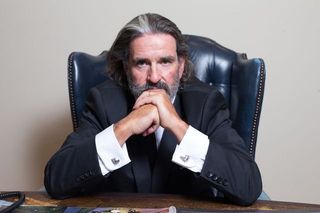Asylum seeker beaten by the system, shackled by the past
Pro Choice supporters hold a protest on O'Connell Street calling on the Government to repeal the 8th amendment
There was a weary sense of deja vu this week. My favourite TV programme is Reeling in the Years, which masterfully combines popular music and political archive. This week the cycle was in the early 1990s. There was a remarkable similarity of content with current affairs, ranging from the first Iraq war, Bosnia, unrest in Russia and the Middle East and the X Case.
The most striking blast from the past was the distressing re-run of another X-Case scenario of a young, pregnant woman, a victim of rape, being refused an abortion.
In this case, because of her immigration status, she could not make the convenient journey to the UK to terminate the crisis pregnancy.
Like Ms X, she was in the control of the State. For reasons yet to be explained, time was allowed to lapse in dealing with her request and the whole sorry saga ended up in the courts, with medical intervention and the premature termination of the pregnancy by caesarean section.
Listening to the well-worn debate this week, one despaired of the polarised presentations. Both sides could bizarrely claim the case vindicated their respective positions. From any perspective, this was a pitiful story. A very young displaced woman in a foreign land, seeks medical termination of an unwanted pregnancy apparently caused by a violent rape. She is trapped by her status as a refugee without legal autonomy to leave the jurisdiction. She is in the control, physically and legally, of the authorities and suicidal at the prospect of the pregnancy.
The lapse of time in responding to the woman's request for an abortion is crucial. The delay caused a calamitous double denial of the woman's rights, both to travel and/or to have her pregnancy terminated due to the risk posed to her life by suicide. Moreover, because the baby had by that stage reached viability, it was delivered prematurely, which - in turn - put its life and health at risk.
What transpired was a parity of misery rather than a rational balancing of the rights of mother and baby under the law. Despite all the forensic examination of the Protection of Life in Pregnancy Bill last year, who could have imagined such an unsatisfactory outcome?
Even leaving aside the suicide provisions of the 2013 Act, the right to travel outside the jurisdiction for an abortion, mandated in a referendum by 62pc of voters and legislated for in 1993, was denied to this woman.
The Department of Justice, charged with responsibility for refugees and asylum seekers, has questions to answer in this case. Given that the Dail is in recess, Justice Minister Frances FitzGerald can shelter behind the HSE's internal review for now.
It would appear that, beyond being told the cost of travelling for a termination, the right of this poor girl to travel was not ultimately vindicated.
What are the protocols, if any, in the Department of Justice for refugees travelling for abortions? Somewhere in the departmental files is a letter from me when I, as Minister of State in the Department of Foreign Affairs, appealed for a refugee woman to be allowed to travel to the UK for an abortion. The Department of Justice had refused her travel documents and I was asked to help her.
Despite my entreaties, she was not permitted to travel, apparently because the department then took the view it would be "facilitating" the act of abortion by giving her travel documents. In the end, after much official delay, she was prevailed upon to continue with the pregnancy as she did not want controversy with the authorities. She was a young asylum seeker who had two small children and was distressed and unable to cope with another pregnancy.
Denied her constitutional right to travel, she was beaten down by the system.
The Labour Party is right to distance itself from a shameful legal mess. The response of Fine Gael, still reeling from Lucinda's revolt, has been one of averted eyes and shifting feet.
Ms FitzGerald, who personally supports abortions in cases of rape, incest and fatal foetal abnormality, was deeply uncomfortable at the recent UN Human Rights hearings and in response to this case.
Thirty years on from the insertion of the Pro Life Clause into the Constitution in 1983, thousands of Irish women continue to have abortions in the UK.
Yet a vocal and fanatical minority continues to impose a fundamentalist ideology, which restricts the Dail's ability to provide a more liberal regime in Ireland in line with public opinion and international human rights norms. The 8th Amendment shackles us to the past and must be removed.
Join the Irish Independent WhatsApp channel
Stay up to date with all the latest news














